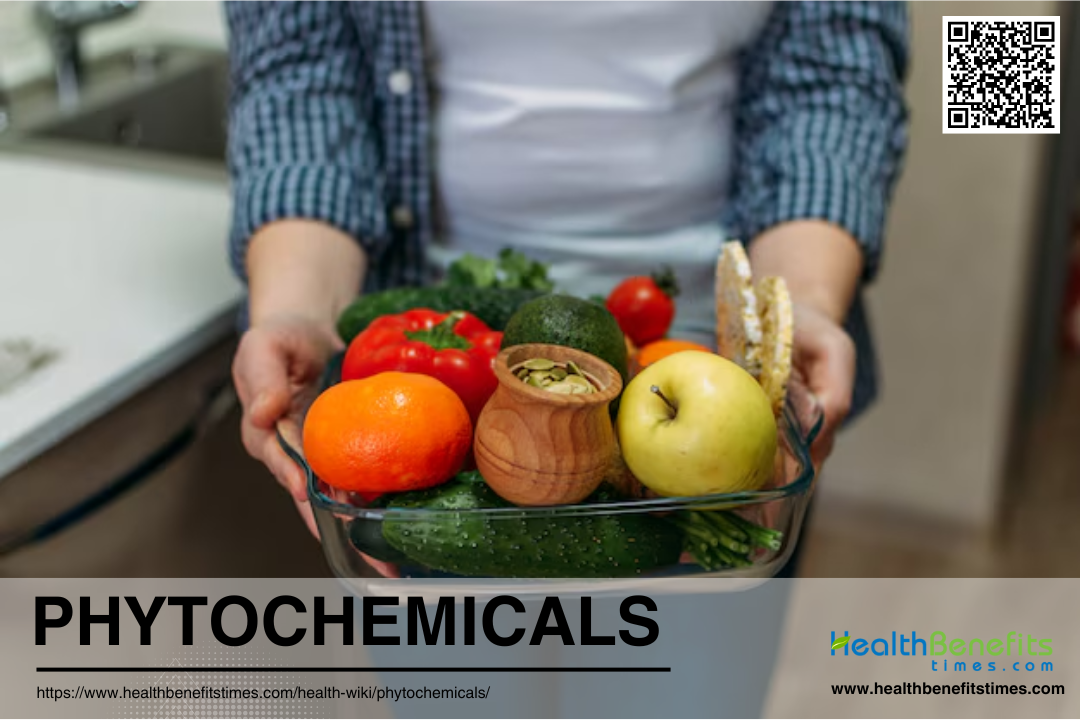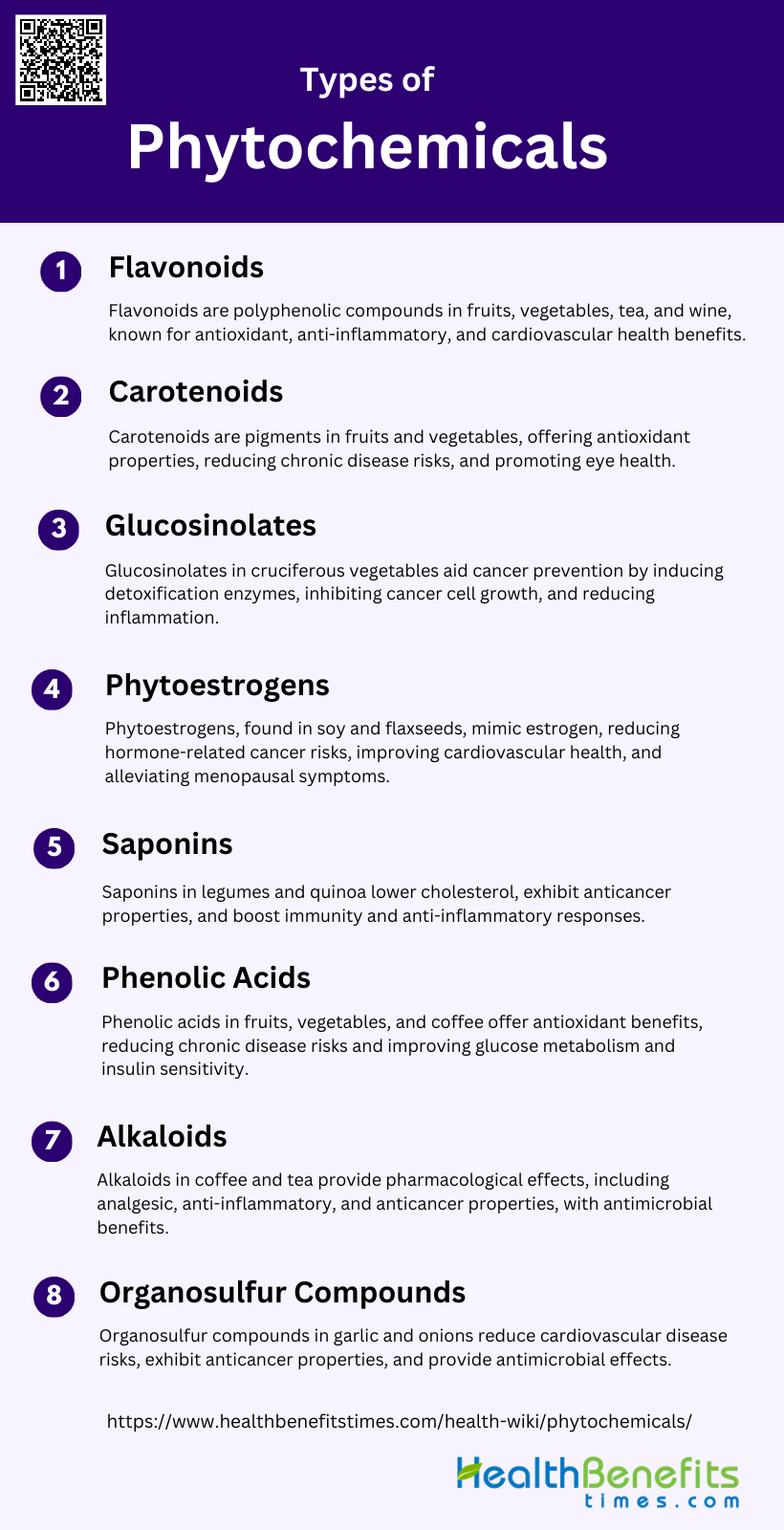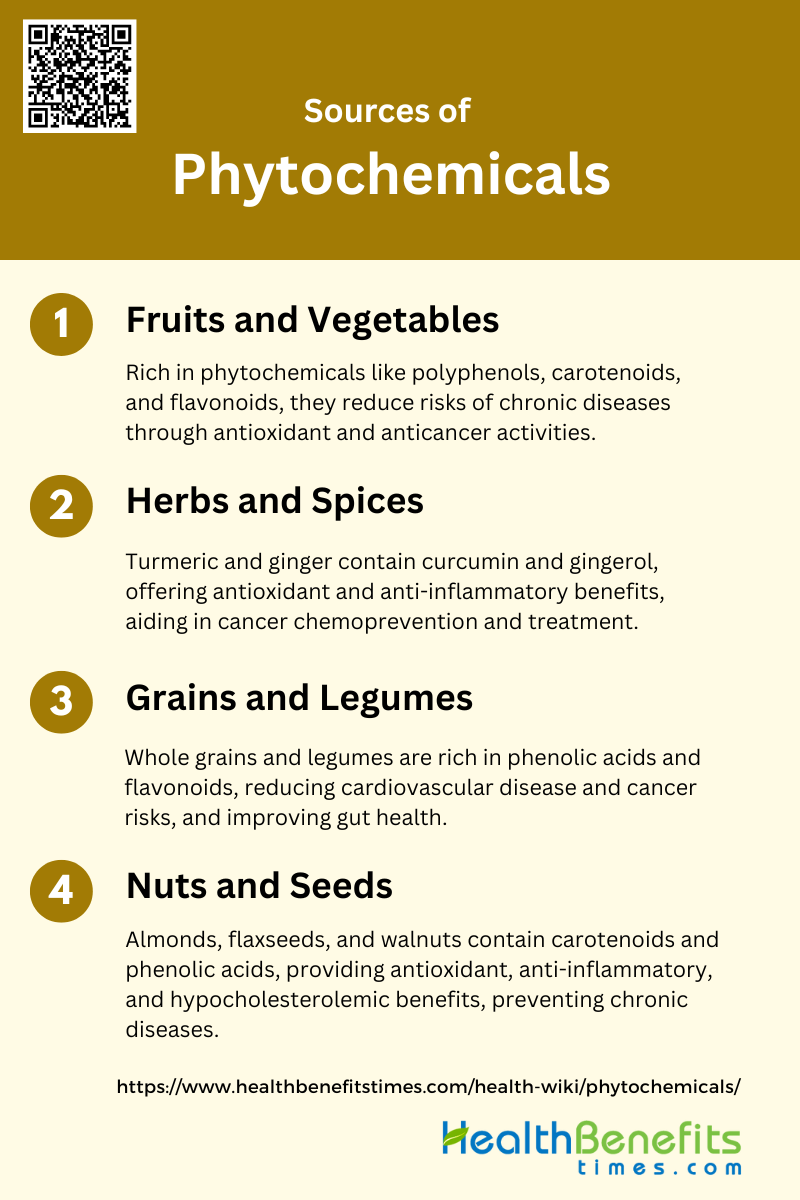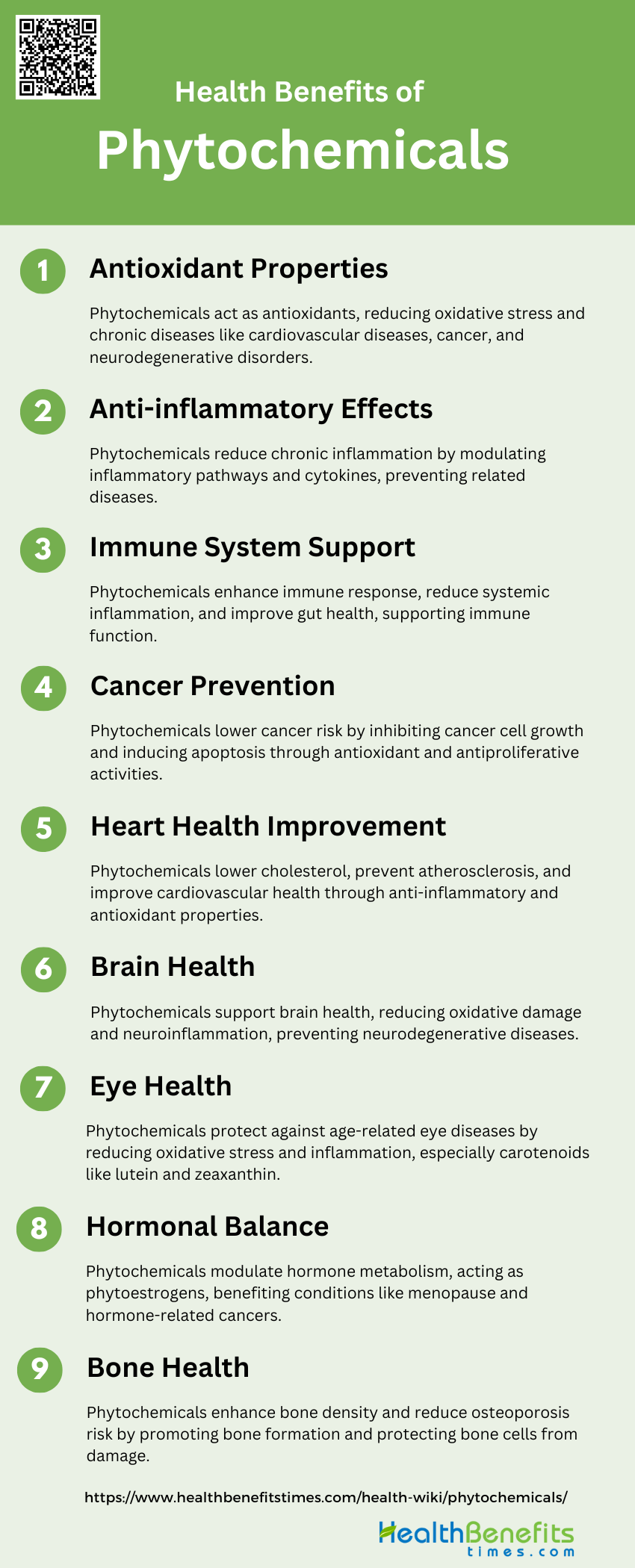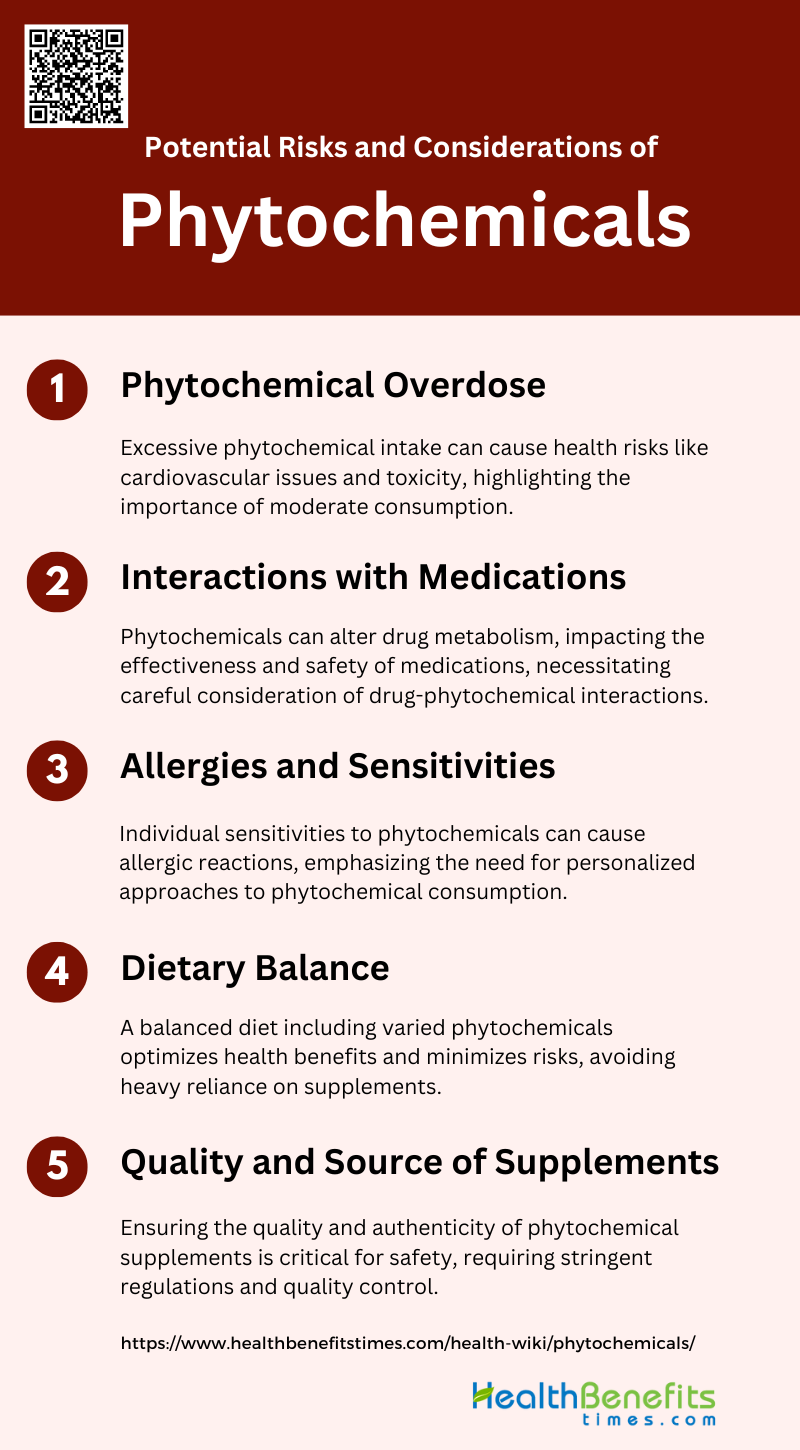Phytochemicals are naturally occurring chemical compounds found in plants that provide various health benefits beyond basic nutrition. These bioactive substances are produced by plants as part of their defense mechanisms against environmental threats such as fungi, bacteria, viruses, and predators. While not considered essential nutrients like vitamins and minerals, phytochemicals have been linked to numerous positive health effects, including improved immune function, cancer prevention, and protection against chronic diseases. There are thousands of known phytochemicals, which can be broadly categorized into groups such as carotenoids, polyphenols, flavonoids, isoflavones, and lignans. These compounds are found in a wide variety of plant-based foods, including fruits, vegetables, whole grains, legumes, nuts, and herbs, and are often responsible for the vibrant colors, distinctive aromas, and unique flavors of these foods. Consuming a diet rich in diverse phytochemicals through whole plant foods is generally recommended for optimal health benefits, rather than relying on isolated phytochemical supplements.
Types of phytochemicals
Phytochemicals are bioactive compounds found in plants that contribute to their color, flavor, and resistance to disease. These compounds offer various health benefits and can be categorized into several types based on their chemical structure and function. Here are some common types of phytochemicals:
1. Flavonoids
Flavonoids are a diverse group of polyphenolic compounds found in many fruits, vegetables, tea, and red wine. They are known for their antioxidant properties, which help in reducing oxidative stress and inflammation, thereby contributing to cardiovascular health and cancer prevention. Flavonoids such as quercetin, catechins, and anthocyanidins have been shown to inhibit platelet aggregation, reduce blood pressure, and improve endothelial function, which are crucial for preventing cardiovascular diseases. Additionally, flavonoids have been studied for their potential anticancer properties, including the ability to induce apoptosis and inhibit cell proliferation in various cancer cell lines.
2. Carotenoids
Carotenoids are pigments found in many fruits and vegetables, giving them their vibrant red, orange, and yellow colors. These compounds, including beta-carotene, lycopene, and lutein, are known for their strong antioxidant properties, which help in neutralizing free radicals and reducing oxidative stress. Carotenoids have been linked to a reduced risk of chronic diseases such as cardiovascular disease and certain types of cancer, particularly prostate cancer. They also play a role in eye health by protecting against age-related macular degeneration and improving overall vision.
3. Glucosinolates
Glucosinolates are sulfur-containing compounds found in cruciferous vegetables like broccoli, Brussels sprouts, and kale. These compounds are known for their role in cancer prevention due to their ability to induce phase II detoxification enzymes, which help in the elimination of potential carcinogens from the body. Glucosinolates are hydrolyzed into biologically active compounds such as isothiocyanates and indoles, which have been shown to inhibit the growth of cancer cells and induce apoptosis. Additionally, they possess anti-inflammatory and antioxidant properties, contributing to overall health benefits.
4. Phytoestrogens
They are found in foods like soy, flaxseeds, and whole grains. Phytoestrogens, such as isoflavones and lignans, have been studied for their potential benefits in reducing the risk of hormone-related cancers, such as breast and prostate cancer. They also play a role in cardiovascular health by improving lipid profiles and reducing the risk of atherosclerosis. Additionally, phytoestrogens have been shown to alleviate menopausal symptoms and improve bone health.
5. Saponins
Saponins are glycosides found in various plant species, including legumes, spinach, and quinoa. They are known for their ability to form soap-like foams when mixed with water. Saponins have been studied for their cholesterol-lowering effects, as they can bind to bile acids and prevent their reabsorption, leading to increased cholesterol excretion. They also exhibit anticancer properties by inducing apoptosis and inhibiting the growth of cancer cells. Additionally, saponins have immune-boosting and anti-inflammatory effects, contributing to overall health benefits.
6. Phenolic Acids
Phenolic acids are a class of polyphenols found in a variety of plant-based foods, including fruits, vegetables, coffee, and whole grains. These compounds, such as caffeic acid and chlorogenic acid, are known for their antioxidant properties, which help in reducing oxidative stress and inflammation. Phenolic acids have been linked to a reduced risk of chronic diseases, including cardiovascular disease and cancer, by inhibiting platelet aggregation, improving endothelial function, and inducing apoptosis in cancer cells. They also play a role in modulating glucose metabolism and improving insulin sensitivity.
7. Alkaloids
Alkaloids are a diverse group of nitrogen-containing compounds found in many plants, including coffee, tea, and certain vegetables. These compounds are known for their pharmacological effects, including analgesic, anti-inflammatory, and anticancer properties. Alkaloids such as caffeine, morphine, and quinine have been extensively studied for their therapeutic potential. They can inhibit the growth of cancer cells, induce apoptosis, and modulate various signaling pathways involved in cancer progression. Additionally, alkaloids have been shown to possess antimicrobial and antioxidant properties, contributing to overall health benefits.
8. Organosulfur Compounds
Organosulfur compounds are found in garlic, onions, and other Allium vegetables. These compounds, including allicin and sulforaphane, are known for their strong antioxidant and anti-inflammatory properties. Organosulfur compounds have been studied for their potential in reducing the risk of cardiovascular diseases by improving lipid profiles, reducing blood pressure, and inhibiting platelet aggregation. They also exhibit anticancer properties by inducing phase II detoxification enzymes, inhibiting cancer cell growth, and inducing apoptosis. Additionally, organosulfur compounds have antimicrobial effects, contributing to overall health benefits.
Sources of Phytochemicals
These bioactive substances are abundant in a variety of fruits, vegetables, grains, and other plant-based foods. Below is a list of common sources of phytochemicals:
1. Fruits and Vegetables
Fruits and vegetables are rich sources of phytochemicals, which are bioactive compounds that provide numerous health benefits. Common sources include berries, citrus fruits, apples, grapes, cherries, apricots, oranges, kale, cabbage, cauliflower, carrots, tomatoes, sweet potatoes, and soybeans. These foods contain a variety of phytochemicals such as polyphenols, carotenoids, flavonoids, and phenolic acids, which have been linked to reduced risks of cancer, cardiovascular disease, stroke, Alzheimer’s disease, and other chronic conditions. The synergistic effects of these compounds in whole foods contribute significantly to their potent antioxidant and anticancer activities.
2. Herbs and Spices
Herbs and spices like turmeric and ginger are also excellent sources of phytochemicals. Turmeric contains curcumin, which has strong antioxidant and anti-inflammatory properties, while ginger contains compounds like gingerol and shogaol that offer similar benefits. These phytochemicals play a role in cancer chemoprevention and treatment by modulating oxidative stress and associated signaling pathways. Additionally, herbs such as garlic, licorice, and various umbelliferous vegetables are noted for their anticancer activities.
3. Grains and Legumes
Whole grains and legumes are abundant in phytochemicals such as phenolic acids, flavonoids, and lignans. These compounds are known for their antioxidant, anti-inflammatory, and anticancer properties. Common examples include beans, soybeans, and various whole grains. The phytochemicals in these foods help reduce the risk of cardiovascular disease and cancer, and they also improve gut health by influencing the composition of gut microbiota.
4. Nuts and Seeds
Nuts and seeds, including almonds, flaxseeds, walnuts, and others, are rich in phytochemicals like carotenoids, phenolic acids, phytosterols, and polyphenolic compounds. These phytochemicals have been associated with antioxidant, anti-inflammatory, and hypocholesterolemic actions, which contribute to the prevention of chronic diseases such as heart disease and cancer. The bioavailability and bioaccessibility of these compounds in nuts and seeds make them effective in promoting health and preventing disease.
Health Benefits of Phytochemicals
Phytochemicals are naturally occurring compounds found in plants that have numerous health benefits. Here are some key benefits:
1. Antioxidant Properties
These antioxidants help mitigate oxidative stress, a key factor in the pathogenesis of various chronic diseases such as cardiovascular diseases, cancer, and neurodegenerative disorders. The antioxidant activity of phytochemicals is attributed to compounds like phenolics and flavonoids found in fruits and vegetables, which work synergistically to provide these health benefits.
2. Anti-inflammatory Effects
Phytochemicals exhibit significant anti-inflammatory effects by modulating various inflammatory pathways and cytokines. These bioactive compounds, found in fruits, vegetables, and legumes, can regulate the production of inflammatory mediators such as nitric oxide, interleukins, and tumor necrosis factor-alpha. The synergistic combination of different phytochemicals enhances their bioavailability and efficacy in reducing chronic inflammation, thereby preventing related chronic diseases.
3. Immune System Support
They act as immunomodulators, influencing the activity of immune cells and the production of antibodies. For instance, polyphenols and carotenoids found in various fruits and vegetables can boost the immune response by reducing systemic inflammation and improving gut health, which is closely linked to immune function.
4. Cancer Prevention
Regular consumption of phytochemical-rich fruits and vegetables is strongly associated with a reduced risk of developing cancer. The anticancer properties of phytochemicals are attributed to their antioxidant and antiproliferative activities. These compounds can inhibit the growth of cancer cells and induce apoptosis through various mechanisms, including the modulation of signaling pathways and the enhancement of antioxidant defenses. The synergistic effects of multiple phytochemicals in whole foods are particularly effective in cancer prevention.
5. Heart Health Improvement
Phytochemicals contribute to heart health by reducing the risk factors associated with cardiovascular diseases. They help lower cholesterol levels, inhibit lipid oxidation, and improve endothelial function. Compounds such as flavonoids, carotenoids, and phytosterols found in fruits, vegetables, and whole grains play a pivotal role in preventing atherosclerosis and improving overall cardiovascular health. The anti-inflammatory and antioxidant properties of these phytochemicals further enhance their cardioprotective effects.
6. Brain Health
These compounds can reduce oxidative damage, improve mitochondrial function, and suppress neuroinflammation. Phytochemicals such as curcumin, resveratrol, and polyunsaturated fatty acids (PUFAs) have been extensively studied for their neuroprotective effects, which include enhancing the integrity of the blood-brain barrier and modulating brain signaling pathways.
7. Eye Health
Phytochemicals, particularly polyphenols and carotenoids, play a significant role in maintaining eye health and preventing age-related ocular diseases such as cataracts, glaucoma, and macular degeneration. These compounds mitigate oxidative stress and inflammation in the eyes, thereby protecting against damage. Carotenoids like lutein and zeaxanthin are especially beneficial in filtering harmful blue light and maintaining retinal health.
8. Hormonal Balance
Compounds such as isoflavones and lignans found in soy and flaxseed can mimic or modulate the action of estrogen in the body, providing benefits in conditions like menopause and hormone-related cancers. These phytochemicals help maintain hormonal equilibrium and support overall endocrine health.
9. Bone Health
Phytochemicals contribute to bone health by enhancing bone density and reducing the risk of osteoporosis. Compounds such as flavonoids and polyphenols found in fruits and vegetables can promote bone formation and inhibit bone resorption. These bioactive compounds also have anti-inflammatory and antioxidant properties that protect bone cells from damage and support overall skeletal health.
How to Increase Phytochemical Intake
Incorporating more phytochemicals into your diet is essential for reaping their numerous health benefits. By consuming a variety of fruits, vegetables, legumes, and whole grains, you can enhance your intake of these vital compounds. Here are some effective strategies to boost your phytochemical consumption:
1. Eating a Variety of Fruits and Vegetables
Consuming a diverse range of fruits and vegetables is a fundamental way to increase phytochemical intake. These foods are rich in various phytochemicals, such as carotenoids, flavonoids, and phenolic acids, which have been linked to reduced risks of chronic diseases, including cancer and cardiovascular diseases. Regular consumption of these plant-based foods can provide a broad spectrum of health benefits due to their antioxidant properties and ability to modulate cellular signaling pathways.
2. Incorporating Herbs and Spices into Meals
Herbs and spices are potent sources of phytochemicals and can significantly enhance the phytochemical content of your diet. Compounds such as curcumin in turmeric and epigallocatechin gallate (EGCG) in green tea have been shown to possess strong antioxidant and anti-inflammatory properties, which can contribute to cancer prevention and overall health improvement. Including a variety of herbs and spices in daily meals can thus be an effective strategy to boost phytochemical intake.
3. Choosing Whole Grains over Refined Grains
Whole grains are rich in phytochemicals, including phenolic acids and flavonoids, which are often lost during the refining process. Consuming whole grains instead of refined grains can increase the intake of these beneficial compounds, contributing to better cardiovascular health and reduced risk of chronic diseases. Whole grains also provide additional nutrients and fiber, which further support overall health.
4. Adding Nuts and Seeds to Your Diet
Nuts and seeds are excellent sources of phytochemicals, such as resveratrol in peanuts and lignans in flaxseeds. These compounds have been associated with various health benefits, including improved heart health and reduced inflammation. Incorporating a variety of nuts and seeds into your diet can thus enhance your phytochemical intake and contribute to better health outcomes.
5. Drink Tea
Tea, especially green tea, is a rich source of phytochemicals like catechins and flavonoids. Regular consumption of tea has been linked to numerous health benefits, including reduced risk of heart disease and certain cancers. Drinking tea daily can be an easy and enjoyable way to increase your intake of these beneficial compounds.
6. Prepare Phytochemical-Rich Breakfasts
Starting your day with a breakfast rich in phytochemicals can set a healthy tone for the rest of the day. Options like fruit smoothies, whole grain cereals, and vegetable omelets can provide a substantial amount of phytochemicals, fiber, and other nutrients. This approach not only increases your daily phytochemical intake but also supports overall dietary quality.
7. Include Phytochemical-Rich Foods in Every Meal
Ensuring that each meal contains phytochemical-rich foods can significantly boost your overall intake. This can be achieved by incorporating a variety of fruits, vegetables, whole grains, nuts, and seeds into your meals. Regularly consuming these foods has been associated with lower body weight, reduced waist circumference, and improved health outcomes. Making phytochemical-rich foods a staple in every meal can thus enhance your diet and promote better health.
Potential Risks and Considerations of Phytochemicals
While phytochemicals offer numerous health benefits, it’s important to be aware of potential risks and considerations associated with their consumption. Overconsumption or improper use of certain phytochemicals can lead to adverse effects or interact negatively with medications. Here are some key points to consider when incorporating phytochemicals into your diet:
1. Phytochemical Overdose
Phytochemicals, while beneficial in moderate amounts, can pose significant health risks when consumed in excess. For instance, high doses of synephrine, a phytochemical found in Citrus aurantium, have been linked to cardiovascular issues, especially when combined with caffeine and physical exertion. Similarly, excessive intake of hydroxycitric acid (HCA) from Garcinia cambogia has been associated with testicular toxicity in animal studies. The dose-dependent effects of phytochemicals are well-documented, indicating that while they can promote health at lower doses, they may exhibit toxicological effects at higher concentrations.
2. Interactions with Medications
Phytochemicals can significantly alter the pharmacokinetics of various drugs, leading to potential drug-phytochemical interactions. These interactions often occur through the modulation of drug-metabolizing enzymes like cytochrome P450 and drug transporters, which can either enhance or inhibit drug absorption and metabolism. For example, St John’s wort has been shown to induce CYP3A4 and CYP2E1 activity, potentially reducing the efficacy of drugs metabolized by these enzymes. Such interactions underscore the need for careful consideration when combining phytochemicals with conventional medications to avoid adverse clinical outcomes.
3. Allergies and Sensitivities
Certain individuals may experience allergic reactions or sensitivities to specific phytochemicals. Herbs and spices, which are rich in phytochemicals, can cause serious health risks for vulnerable groups such as pregnant women and infants if consumed unconsciously and uncontrollably. The variability in individual responses to phytochemicals necessitates personalized approaches to their consumption, especially in populations with heightened sensitivity or pre-existing conditions. Awareness and caution are essential to prevent adverse reactions stemming from phytochemical intake.
4. Dietary Balance
Maintaining a balanced diet that includes phytochemicals is crucial for optimizing health benefits while minimizing risks. Phytochemicals can act as substrates, cofactors, inhibitors, and scavengers in various biochemical reactions, contributing to overall health. However, the rapid growth in the use of phytochemicals in nutraceuticals and functional foods has raised concerns about their efficacy and safety. Ensuring a balanced intake of phytochemicals through a varied diet, rather than relying heavily on supplements, can help mitigate potential risks and promote better health outcomes.
5. Quality and Source of Supplements
The quality and source of phytochemical supplements are critical factors that influence their safety and efficacy. Botanical dietary supplements (BDS) often contain complex mixtures of phytochemicals, and their pharmacological properties can vary significantly based on their source and preparation. The global market for BDS has expanded, increasing the risk of exposure to exotic phytochemicals with unknown safety profiles. Ensuring the quality and authenticity of these supplements through stringent regulations and quality control measures is essential to prevent adverse health effects and ensure consumer safety.


